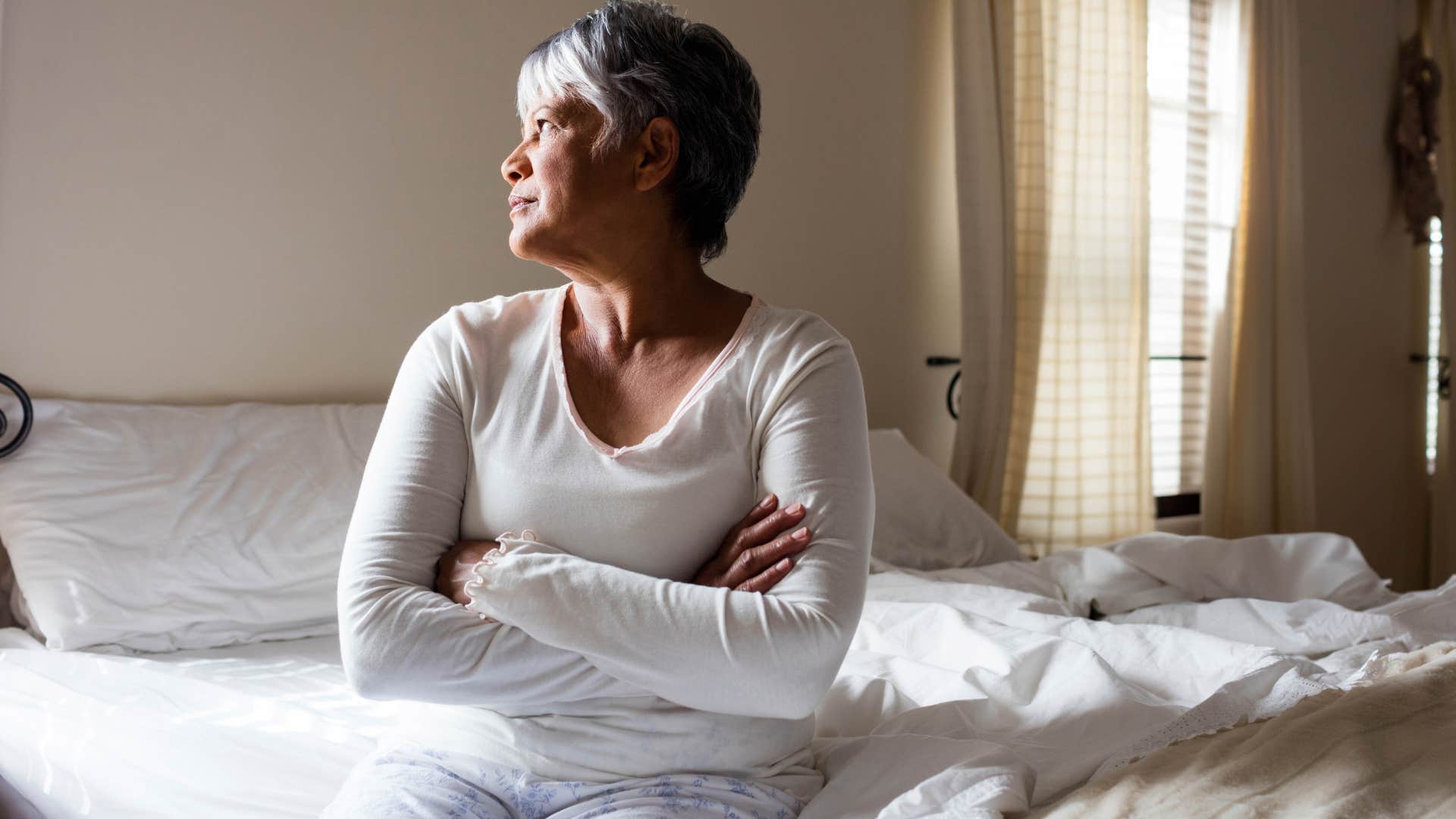If You Notice These 11 Things At Your Parents' House, They’re Struggling More Than They Admit
Keep a close eye out for these subtle changes in your parents.
 Red Stock / Shutterstock
Red Stock / Shutterstock Many older parents experience more stress and relationship tension than their younger counterparts. And when their children move out of the house, several unique struggles also begin to trouble them, from issues with their now-grown children to feelings of disconnection and isolation.
If you notice certain things at your parents' house that indicate loneliness or neglect, they may be struggling more than they have admitted to you. They may try to keep these subtle struggles to themselves because they're worried about burdening their kids or families, but with age comes new challenges that are nearly impossible to tackle alone.
If you notice these 11 things at your parents’ house, they’re struggling more than they admit
1. There’s more clutter than normal
 Krakenimages.com | Shutterstock.com
Krakenimages.com | Shutterstock.com
While younger individuals may experience more intense psychological consequences from clutter in their living space, people of all age demographics experience more stress, emotional turmoil, and relationship dissatisfaction when they’re living in a visually cluttered and unclean environment, according to a study published in the Behavioral Sciences journal.
From overflowing laundry hampers to trash cluttered in common spaces, if you notice these things at your parents’ house, they’re struggling more than they admit. Even if they’re not entirely aware of the causes for more clutter, from mobility issues to time constraints, and even mental health obstacles, they can negatively affect their daily lives and well-being.
2. Expired food
 Ground Picture | Shutterstock.com
Ground Picture | Shutterstock.com
A healthy diet and routine around food is wildly important for individuals, especially as they get older. Not only does a nutritious and balanced diet promote better physical health and bodily processes, it also enhances a person’s quality of life by giving them more energy and promoting a better psychological state, as a study published in the Nutrients journal explains.
So, if you visit your parents or stop by their home and notice their pantry is empty or their fridge is filled with only expired foods, chances are they’re not getting the nutrients and foods they need to thrive. They may not realize that their tendency toward processed and fast alternatives is sabotaging their quality of life and general health, especially if it’s convenient or saves them money. Still, in the long run, it can greatly contribute to their existing struggles.
3. Piles of unopened mail
 Rocketclips, Inc | Shutterstock.com
Rocketclips, Inc | Shutterstock.com
There are a number of alarming reasons why someone might avoid opening their mail and let it pile up in their home, from dealing with unresolved trauma, to current mental health struggles, and even avoidant tendencies. Rather than acknowledging the issue and taking steps to overcome it, opening and keeping up with their mail, they avoid it and suppress their discomfort.
If you notice these things at your parents’ house, it could also be a signal that they’re struggling with time more than they’d like to admit. Either they’re taking on emotional burdens that sabotage their schedule or working too many hours, but it’s keeping them from staying up to date on even the most basic tasks.
4. Their bed is unmade
 Wavebreakmedia | Shutterstock.com
Wavebreakmedia | Shutterstock.com
Abnormal sleeping habits and even napping too often during the day can put aging individuals at a higher risk for physical health issues like cardiovascular disease, according to a study published in the Journal of the American Heart Association. However, an unmade bed or a recognition of a parent’s poor sleeping habits can also be a sign of deeper psychological struggles like depression or loneliness.
Another study in The Lancet Psychiatry journal suggests that sleeping during the day and staying awake later into the night, especially for older individuals and aging parents, can be a sign of depression or social isolation. Even if it seems subtle, especially for adult children who only visit their parents every once in a while, it can be a sign they’re struggling more than they’d like to admit.
5. There are unpaid bills lying around
 Irene Miller | Shutterstock.com
Irene Miller | Shutterstock.com
According to a report from the National Council on Aging, more than 80% of older adults are facing financial insecurity, setting them back from saving for retirement, affording basic necessities, and even investing in experiences later in life. Even if it’s something they don’t want to burden their adult children with, there are many signs that a parent is struggling with money that are obvious when you visit their living space.
From broken furniture that’s been left unfixed to loose unpaid bills hanging around on the counters, if you notice these things at your parents' house, they’re struggling more than they admit.
6. They’re struggling to get around
 Inside Creative House | Shutterstock.com
Inside Creative House | Shutterstock.com
While they might seem intuitive or simple for the average adult child, our living spaces, home environments, and daily tasks are relatively nuanced when it comes to issues like physical limitations and obstacles with mobility. As parents age, they often face challenges navigating their home and performing household tasks they once took for granted.
While they might understate their struggles to adult children, often coping with embarrassment, shame, or fears of burdening their kids, if you notice makeshift mobility tools or a parent struggling to get around their home when you visit, they may be struggling more than they admit.
7. Everything feels sterile
 Suriyawut Suriya | Shutterstock.com
Suriyawut Suriya | Shutterstock.com
Considering many parents experience more loneliness and isolation as they age, things like home decor and visible sentimental items in their living space can play a huge role in helping them feel safer, loved, and comfortable. Of course, there are also numerous psychological and physical health benefits to having simple things like family photos hanging in your living space, reminding you of positive memories, loved ones, and relationships, even if you’re struggling with mental health or loneliness at home.
So, if you notice your parents’ home is relatively sterile, without home decor, personality, family photos, or sentimental items inside, that could be a sign that they’re struggling with feelings of loneliness, isolation, or depression.
8. There’s an unpleasant smell
 Andrey_Popov | Shutterstock.com
Andrey_Popov | Shutterstock.com
An unpleasant smell is one of the first things you might notice in the home of a parent who’s silently struggling. In fact, it’s likely one of the things that feels impossible to ignore.
From neglecting deep cleaning their house for a while to hosting overflowing trash cans, an unpleasant smell can be a sign that a parent is struggling with various issues at home, from mobility to mental health, and even maintaining a healthy balance of responsibilities with their spouse.
9. Broken furniture or burnt out lightbulbs
 New Africa | Shutterstock.com
New Africa | Shutterstock.com
Broken furniture, unchanged light bulbs, and clutter around the house can be a sign of numerous struggles of the person living there, from mobility and health issues to a lack of time, mental health struggles, and even financial burdens.
They may not have the time or money to fix things themselves or hire someone to do it for them. It’s also possible that their physical limitations and age are getting in the way, making small tasks and household repairs feel impossible.
As adult children, we can support our parents later in life by doing for them what they did for us when we were kids, showing up at the front door with a broken bicycle chain or homework we didn’t quite understand.
10. Their yard is overgrown
 Fast-stock | Shutterstock.com
Fast-stock | Shutterstock.com
Many people struggle with keeping up on household tasks and chores, alongside outdoor labor like lawn care and gardening, as they get older. Especially if they’re isolated from their families, without help from family members and adult children, things like unkempt lawns and overgrown gardens can be signs that they’re struggling.
According to a study published in the Home Health Care Management & Practice journal, having landscapers or a gardening service can significantly influence an aging person’s quality of life, emotional well-being, and sense of independence, of course, if they have access or the money to afford them.
So, if you notice these things at your parents’ house, they may be struggling more than they admit. However, simply indulging some of these habits and chores that may seem obvious and simple to you can be a huge signal of support, helping them to focus more on the little things and joys in their lives, and less on the chores and labor that cultivates shame, resentment, and frustration.
11. Safety issues
 Dmytro Zinkevych | Shutterstock.com
Dmytro Zinkevych | Shutterstock.com
Whether it’s a broken fixture, a steep staircase, or clutter that blocks clear pathways on the ground, if you notice these things at your parents’ house, they’re probably struggling more than they'd like to admit. Especially later in life, things like bathroom and general home safety become more important.
So, even if your parents don’t have the money, time, or energy to do it themselves, there's an opportunity for adult children to step in and make their quality of life better, safer, and more efficient.
Zayda Slabbekoorn is a staff writer with a bachelor’s degree in social relations & policy and gender studies who focuses on psychology, relationships, self-help, and human interest stories.

